21 Easy Mediterranean Diet Recipes: Your 7-Day Beginner Meal Plan
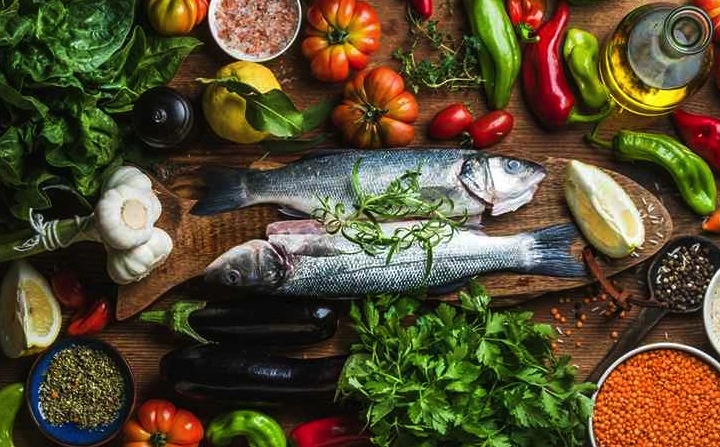
FYI: If you’re looking for Mediterranean meal ideas specifically for weight loss or lowering cholesterol
FYI: If you’re looking for Mediterranean meal ideas specifically for weight loss or lowering cholesterol,
Looking for a diet that’s both delicious and scientifically proven to improve your health? The 7-day Mediterranean diet recipes in this beginner’s guide might be exactly what you need.
The Mediterranean diet has been voted the best diet 8 years in a row for good reason. Years of research show that following this eating pattern can help reduce your risk of strokes and cardiovascular disease, including heart disease. Additionally, a study that followed more than 25,000 American women for up to 25 years found those who adhered more closely to a Mediterranean diet had up to 23% lower risk of all-cause mortality.
This 7-day Mediterranean diet meal plan is designed specifically for beginners, offering a balanced approach set at 1,200 calories with modifications for 1,500 and 2,000 calories. Each day provides at least 51 grams of protein and 30 grams of fiber to keep you feeling satisfied. The plan features diabetes-friendly foods, including low-glycemic-index carbohydrates, complete proteins, and healthy fats like olive oil. Whether you’re looking to improve your overall health or simply want to try a new way of eating, this comprehensive guide makes getting started easier than ever.

Start your Mediterranean journey with this simple yet satisfying breakfast that takes less than 5 minutes to prepare. Greek yogurt with berries and walnuts delivers a protein-packed meal to keep you full throughout the morning while offering a perfect balance of flavors and textures.
Greek Yogurt Ingredients
For this nourishing breakfast, you’ll need:
- 1 cup plain Greek yogurt (nonfat or full-fat depending on preference)
- ½ cup fresh berries (blueberries, strawberries, raspberries, or a mix)
- 1-2 tablespoons chopped walnuts
- 1 teaspoon honey (optional for sweetness)
Greek Yogurt Preparation Steps
Simply place the Greek yogurt in a bowl, top with berries, sprinkle with chopped walnuts, and drizzle with honey if desired. This no-cook breakfast requires zero blending or heating—just scoop, top, and enjoy. For busy mornings, prep the yogurt, berries, and honey in a jar the night before, then add walnuts just before eating to maintain their crunch.
Greek Yogurt Nutritional Info
This power-packed breakfast contains approximately 250 calories, 19.5g protein, 35.5g carbohydrates, and only 4.5g fat when made with nonfat yogurt. The high protein content (around 20g per cup) helps keep hunger at bay, while probiotics in the yogurt support gut health. The berries add essential fiber and antioxidants, furthermore, the walnuts provide healthy fats and satisfying crunch.
Greek Yogurt Meal Timing
This versatile dish works perfectly as a quick breakfast or afternoon snack. Many Mediterranean diet enthusiasts enjoy this meal as their first breakfast of the day, consequently setting themselves up for balanced energy levels throughout the morning.
Greek Yogurt Calorie Modifications
To increase calories to 1,500, add 2 clementines and ⅓ cup unsalted dry-roasted almonds to your day. For a 2,000 calorie plan, additionally include 1 whole-wheat English muffin with 1½ tablespoons almond butter at breakfast. Alternatively, use full-fat Greek yogurt instead of nonfat for a richer, more satisfying meal with additional calories.
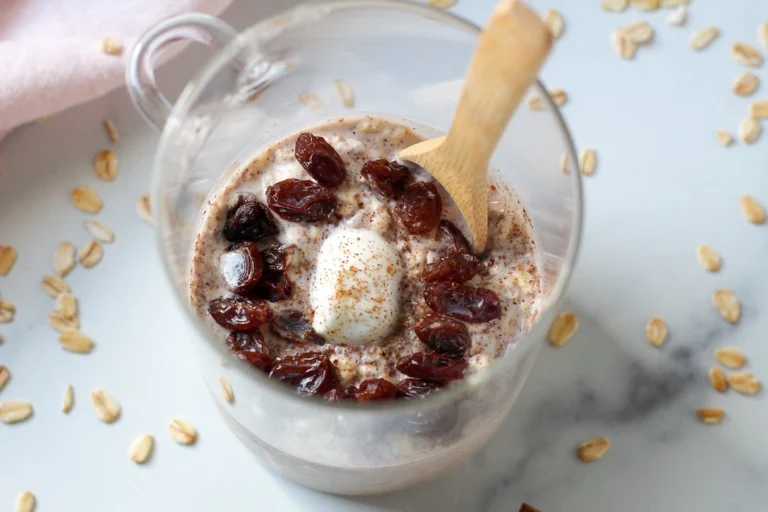
Prepare this Mediterranean diet-friendly breakfast the night before for a stress-free morning. Cinnamon Roll Overnight Oats deliver classic cinnamon roll flavors without the guilt, moreover, they’re packed with fiber to keep you satisfied until lunch.
Cinnamon Oats Ingredients
To make this fiber-filled breakfast, gather:
- ½ cup old-fashioned rolled oats (avoid quick or steel-cut varieties)
- ½ cup unsweetened non-dairy milk (almond or coconut work well)
- 2-3 teaspoons light brown sugar (or maple syrup)
- ½-1 teaspoon ground cinnamon
- 1 teaspoon chia seeds
- ½ teaspoon vanilla extract
- Pinch of salt
- 3 tablespoons Greek yogurt (optional, for extra creaminess)
Cinnamon Oats Preparation Steps
Essentially, this recipe requires just a few minutes of evening prep. First, combine all ingredients in a jar or container with a lid. Second, stir thoroughly until well mixed. Finally, seal the container and refrigerate overnight or for at least 4 hours. In the morning, give the mixture a quick stir, add a splash of milk if needed, and enjoy either cold or warmed up.
Cinnamon Oats Nutritional Info
Each serving provides approximately 191-250 calories, 4-6g of protein, and 4-6g of fiber. The oats offer complex carbohydrates that provide sustained energy throughout your morning. Although humble in appearance, oats are powerful prebiotics that feed beneficial gut bacteria. The chia seeds add healthy omega-3 fatty acids and help thicken the mixture.
Cinnamon Oats Meal Timing
This versatile breakfast can be prepared up to 5 days in advance, making it perfect for your 7-day Mediterranean diet meal plan. Store sealed jars in the refrigerator for a grab-and-go option on busy mornings. After all, having breakfast ready means one less decision to make during hectic mornings.
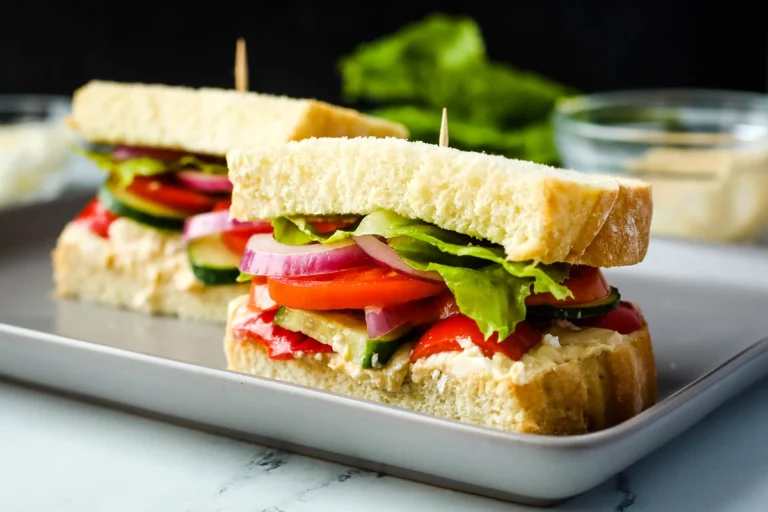
This flavorful veggie and hummus sandwich offers a perfect Mediterranean lunch option that balances protein, fiber, and fresh vegetables. A staple in the 7-day Mediterranean diet meal plan, this sandwich provides lasting energy without weighing you down.
Veggie Sandwich Ingredients
For this nutrient-packed sandwich, you’ll need:
- 2 slices whole-grain bread (hearty varieties work best)
- 2-3 tablespoons hummus
- ¼ avocado, mashed (optional)
- ½ cup mixed greens or spinach
- ¼ medium red bell pepper, sliced
- ¼ cup sliced cucumber
- ¼ cup shredded carrot
- Optional add-ins: red onion, feta cheese, kalamata olives
Veggie Sandwich Preparation Steps
First, lightly toast the bread to prevent sogginess. Next, spread hummus on one slice and mashed avocado (if using) on the other. Then layer the greens, followed by all other vegetables. Subsequently, add any optional ingredients like feta cheese or olives. Finally, close the sandwich, slice in half, and serve immediately.
Veggie Sandwich Nutritional Info
One sandwich provides approximately 325 calories, 13g protein, 40g carbohydrates, 12g fiber, and 14g fat. Notably, this plant-powered meal delivers 55% of your daily vitamin C needs and supports gut health through fiber-rich vegetables.
Veggie Sandwich Meal Timing
This sandwich is ideal for lunch in your 7-day Mediterranean diet plan. Therefore, it’s best eaten immediately after preparation to prevent the bread from becoming soggy. For meal prep, store components separately and assemble just before eating.
Veggie Sandwich Calorie Modifications
To increase calories, add extra protein with rotisserie chicken or deli meat. Alternatively, use additional avocado or a drizzle of olive oil. For a lower-calorie version, use thinner bread slices or create an open-faced sandwich.
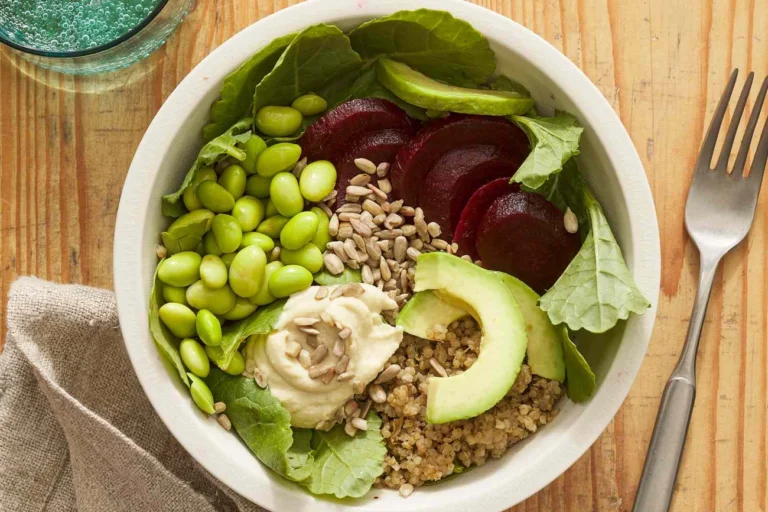
Power up your 7-day Mediterranean diet meal plan with this colorful vegan superfood grain bowl that combines protein-rich ingredients with vibrant vegetables. This nutrient-packed dish comes together quickly, making it perfect for busy weeknights or meal prep lunches.
Grain Bowl Ingredients
For this nourishing Mediterranean bowl, you’ll need:
- 1 (8 ounce) pouch microwavable quinoa
- ½ cup hummus
- 2 tablespoons lemon juice
- 1 (5 ounce) package baby kale
- 1 (8 ounce) package refrigerated cooked whole baby beets, sliced
- 1 cup frozen shelled edamame, thawed
- 1 medium avocado, sliced
- ¼ cup unsalted toasted sunflower seeds
Grain Bowl Preparation Steps
This bowl comes together in just 15 minutes with these simple steps:
- Prepare quinoa according to package directions and set aside to cool
- In a small bowl, combine hummus and lemon juice to create a dressing; thin with water to desired consistency
- Divide the dressing among containers if meal prepping
- Layer baby kale in containers, then top with ½ cup quinoa, ½ cup beets, ¼ cup edamame, and 1 tablespoon sunflower seeds
- Add ¼ avocado and hummus dressing just before eating
Grain Bowl Nutritional Info
Each serving delivers impressive nutrition with approximately 381 calories, 19g fat, 43g carbohydrates, and 16g protein. The bowl also provides 13g of fiber (47% of daily needs) and is rich in essential nutrients including 75% of your daily vitamin A needs. Since this Mediterranean bowl contains whole grains, legumes, and vegetables, it aligns perfectly with the Mediterranean diet pyramid.
Grain Bowl Meal Timing
This versatile recipe works wonderfully for lunch or dinner within your 7-day Mediterranean meal plan. You can refrigerate these bowls and dressing separately for up to four days, yet always add the avocado just before eating to prevent browning. For busy days, having these components prepped makes healthy eating remarkably simple.
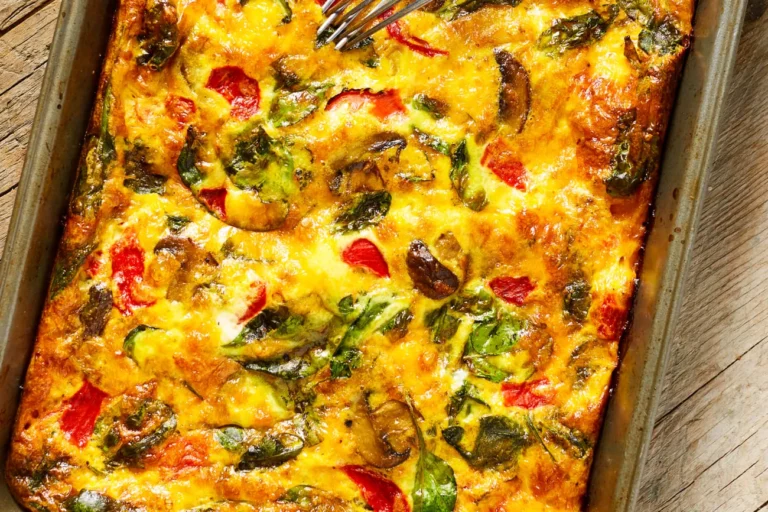
Elevate your 7-day Mediterranean diet meal plan with this wholesome Vegetarian Spring Egg Casserole that brings together seasonal vegetables and protein-rich eggs in one satisfying dish.
Egg Casserole Ingredients
This Mediterranean-inspired casserole requires:
- 3 tablespoons unsalted butter
- 1½ cups chopped scallions
- 4 cloves garlic, finely chopped
- 6 ounces fresh baby spinach, chopped
- 1 cup whole milk
- 4 ounces reduced-fat cream cheese, softened
- 6 large eggs, beaten
- ¾ cup shredded whole-milk mozzarella cheese
- ½ teaspoon salt
- 8 ounces whole-grain crusty bread, cut into 1-inch cubes
- 12 ounces asparagus, trimmed and cut into 1-inch pieces
Egg Casserole Preparation Steps
First, melt butter in a large skillet over medium-high heat. Sauté scallions and garlic for 2 minutes, then add spinach and cook until wilted. Next, whisk milk with cream cheese, then stir in eggs, mozzarella, and salt. Add bread cubes and asparagus, followed by the spinach mixture. Pour into a 9×13-inch baking dish. Cover; refrigerate for at least 8 hours. Bake at 350°F, covered for 30 minutes, then uncovered for 25-30 minutes more.
Egg Casserole Nutritional Info
Each serving provides 267 calories, 15g fat, 20g carbs, 4g fiber, and 15g protein. Plus, it delivers 50% of your daily vitamin A needs.
Egg Casserole Meal Timing
Primarily designed for breakfast, yet it works equally well for brunch or dinner. Actually, you can prepare it the night before—perfect for busy mornings in your Mediterranean diet plan.
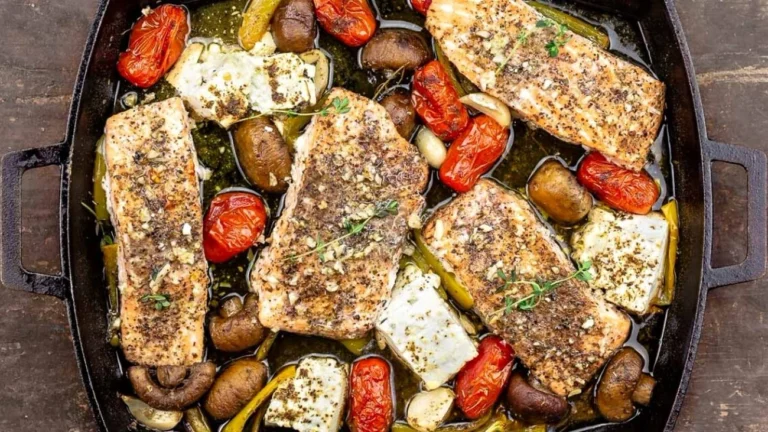
Transform your dinner routine with this time-saving sheet-pan salmon recipe that fits perfectly into your 7-day Mediterranean diet meal plan. This easy dinner option delivers both flavor and nutrition in a single pan.
Salmon Sheet-Pan Ingredients
For this Mediterranean-inspired dish, you’ll need:
- 4 salmon filets (4-5 oz each)
- 2 medium sweet potatoes, sliced into wedges
- 4-5 cups vegetables (broccoli, bell peppers, or cherry tomatoes)
- 2 tablespoons olive oil
- Seasonings: salt, pepper, garlic powder, paprika
- 2-3 tablespoons Dijon mustard
- 1-2 tablespoons honey (optional)
- Fresh herbs like thyme or dill
Salmon Sheet-Pan Preparation Steps
Firstly, preheat your oven to 425°F. Toss sweet potatoes with olive oil, salt, and pepper, then roast for 15 minutes. Meanwhile, prepare salmon by coating with Dijon mustard, honey, and seasonings. Once potatoes have had their head start, add seasoned salmon to the center of the pan alongside your vegetables. Continue roasting for another 10-15 minutes until salmon flakes easily with a fork.
Salmon Sheet-Pan Nutritional Info
Each serving provides approximately 398-504 calories, 31-34g protein, and 34-42g carbohydrates. In fact, this meal delivers about 26% of your daily potassium needs.
Salmon Sheet-Pan Meal Timing
This versatile dish works wonderfully for dinner in your Mediterranean meal plan. Throughout the week, you can prep components ahead for faster assembly. Plus, leftovers store well for up to 5 days in an airtight container.
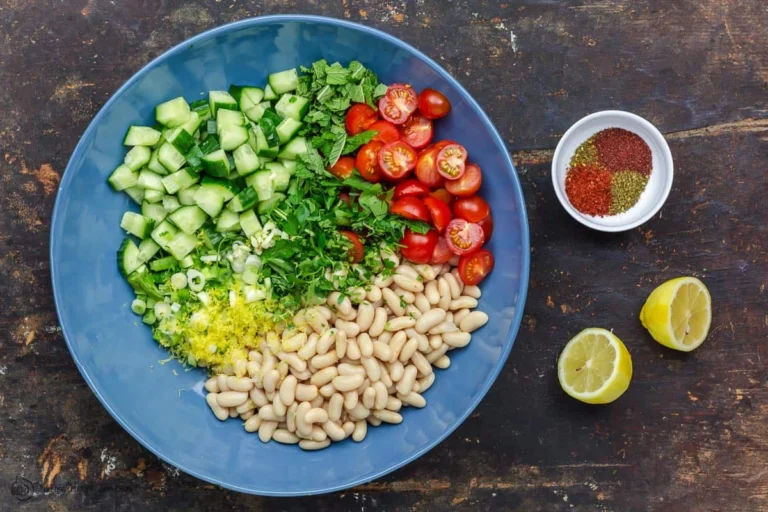
Beans serve as a cornerstone of the 7-day Mediterranean diet meal plan, particularly evident in this refreshing White Bean and Veggie Salad. This protein-rich dish offers a perfect light lunch or side that complements any Mediterranean menu.
White Bean Salad Ingredients
This simple yet flavorful salad requires:
- 2 cups mixed salad greens
- 1 can (15 oz) white cannellini beans, drained and rinsed
- ¾ cup vegetables (cucumber, cherry tomatoes)
- ½ avocado, diced
- 1 tablespoon red wine vinegar
- 2 teaspoons extra-virgin olive oil
- Fresh herbs (parsley or basil)
- Salt and pepper to taste
- Optional add-ins: feta cheese, olives, bell peppers
White Bean Salad Preparation Steps
Primarily, combine greens, veggies, beans and avocado in a medium bowl. Next, drizzle with vinegar and oil, then season with salt and pepper. Finally, toss everything together until well combined. For best results, let the salad rest for 15-30 minutes before serving to allow flavors to meld.
White Bean Salad Nutritional Info
Each serving provides approximately 360 calories, 10g protein, 30g carbohydrates, and 25g fat. Regardless of its modest appearance, this salad delivers impressive nutrition with 13g fiber (48% of daily value) and serves as an excellent source of potassium (27% daily value). Furthermore, it contains significant amounts of vitamin A (64%) and vitamin C (33%).
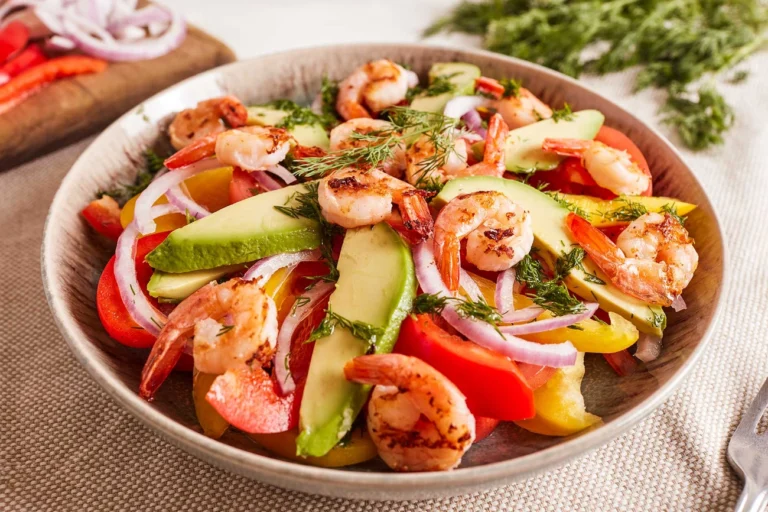
This vibrant Summer Shrimp Salad adds refreshing Mediterranean flair to your 7-day diet plan, combining succulent seafood with crisp vegetables in a light, tangy dressing.
Shrimp Salad Ingredients
For this refreshing dish, gather:
- 1-2 pounds large shrimp, peeled and deveined
- 2-3 tablespoons extra virgin olive oil
- Juice of 1-2 lemons
- 1 medium cucumber, diced
- Cherry or grape tomatoes, halved
- 1 avocado, diced
- ½ cup corn kernels (fresh or cooked)
- ¼ red onion, thinly sliced
- Fresh herbs (cilantro, parsley, or dill)
- Optional: jalapeño for heat
Shrimp Salad Preparation Steps
Initially, cook the shrimp by boiling in salted water for 3-4 minutes until pink and opaque. Immediately transfer to an ice bath to stop cooking. Once cooled, drain thoroughly. In a separate bowl, whisk together olive oil, lemon juice, salt, and pepper to create the dressing. Combine the cooked shrimp with vegetables, gently toss with the dressing, then refrigerate for 30 minutes prior to serving to allow flavors to meld.
Shrimp Salad Nutritional Info
Each serving provides approximately 250-290 calories, with 28g protein, 10-12g carbohydrates, and 11-16g fat. In addition to being protein-rich, this salad delivers 25mg vitamin C (28% daily value) plus valuable omega-3 fatty acids from the seafood.
Shrimp Salad Meal Timing
Throughout your 7-day Mediterranean diet meal plan, this versatile salad works ideally for lunch or as a light dinner, especially on warm days. You can prepare components ahead of time, yet it’s best consumed within 1-2 days of preparation. Keep in mind that avocado should be added just before serving to prevent browning.
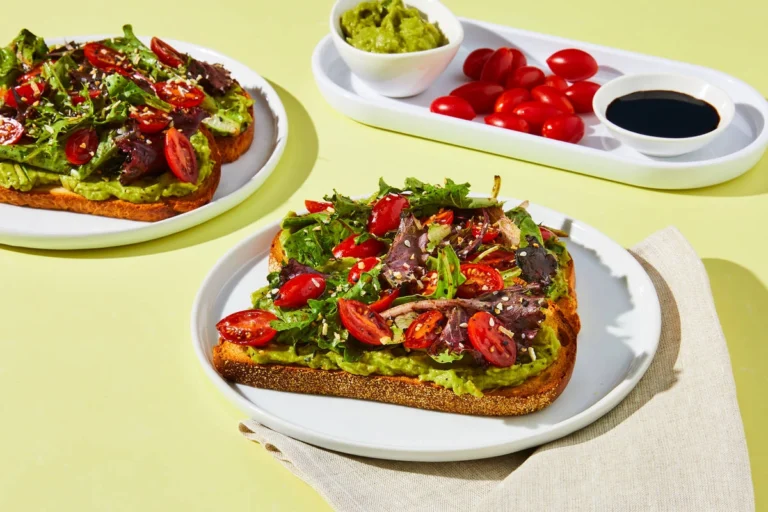
Add a creative twist to your 7-day Mediterranean diet meal plan with this quick Everything Bagel Avocado Toast that brings bold flavors and healthy fats to your breakfast routine.
Avocado Toast Ingredients
This simple yet satisfying toast requires just four key components:
- 1 slice whole-grain bread (or your preferred bread type)
- ¼ medium ripe avocado
- 2 teaspoons everything bagel seasoning
- Pinch of flaky sea salt
Optional add-ins include a handful of arugula, cherry tomatoes, kalamata olives, or feta cheese for extra Mediterranean flair.
Avocado Toast Preparation Steps
The beauty of this recipe lies in its simplicity. First, toast your bread slice to your preferred crispness. Next, scoop out the avocado and mash it in a bowl with a fork until mostly smooth with some small chunks remaining. Then, spread the mashed avocado evenly on the toast. Finally, sprinkle with everything bagel seasoning and a pinch of salt.
Avocado Toast Nutritional Info
One serving provides approximately 172-241 calories depending on bread choice. Each toast delivers 5-6g protein, 18g carbohydrates, and 10g healthy fats. Furthermore, this nutritional powerhouse contains 6g fiber (21% of daily value), making it an excellent addition to your Mediterranean breakfast rotation.
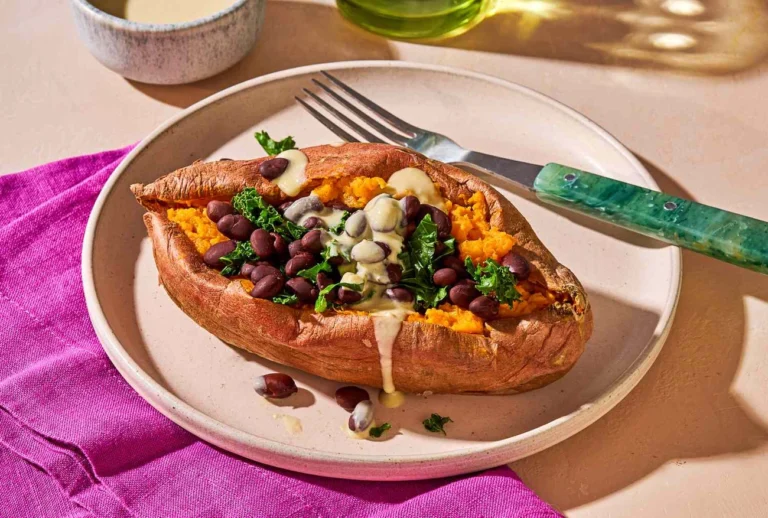
This hearty stuffed sweet potato offers a versatile option for your 7-day Mediterranean diet meal plan, combining complex carbs with protein-rich chickpeas and a zesty hummus topping.
Stuffed Sweet Potato Ingredients
For this satisfying dish, you’ll need:
- 1 medium sweet potato
- 1 tablespoon olive oil
- 1 can (15 oz) chickpeas, drained and dried
- Spices: ½ teaspoon each of cumin, cinnamon, smoked paprika, garlic powder
- ¼ teaspoon salt
- ¼ cup diced tomatoes
- ¼ cup fresh parsley, chopped
For the hummus dressing:
- ½ cup hummus
- 1 tablespoon lemon juice
- 1 teaspoon dried dill
- 1 garlic clove, minced
- Water to thin
Stuffed Sweet Potato Preparation Steps
Preheat oven to 400°F (204°C). Cut the sweet potato lengthwise, rub with half the oil, and place face-down on a baking sheet. Toss chickpeas with remaining oil and spices, spread on the same baking sheet. Bake together for 25 minutes until the potato is fork-tender. Mix hummus with lemon juice, dill, garlic, and enough water to create a pourable consistency. Serve by slightly opening each potato half, filling with seasoned chickpeas and tomatoes, then drizzling with hummus sauce.
Stuffed Sweet Potato Nutritional Info
Each serving provides approximately 308 calories, 10.9g protein, 54.7g carbohydrates, and 11.9g fiber. This meal delivers 18,597 IU of vitamin A and serves as an excellent source of iron (2.5mg).
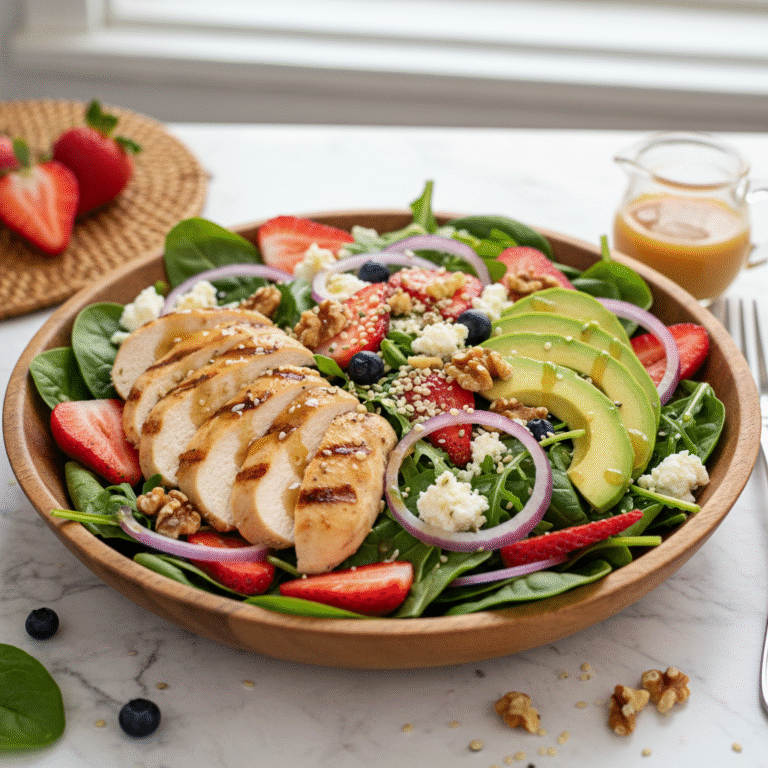
Bring sweet and savory flavors together with this Strawberry Chicken Salad—a delightful addition to your 7-day Mediterranean diet meal plan that balances lean protein with antioxidant-rich berries.
Strawberry Chicken Salad Ingredients
This refreshing salad requires:
- 1 pound chicken breast, trimmed and tenderized
- 4-6 cups mixed salad greens or spinach-arugula blend
- 1 cup fresh strawberries, hulled and sliced
- ¼ cup red onion, thinly sliced
- ½ cup nuts (walnuts or almonds)
- ¼ cup cheese (feta, goat cheese, or blue cheese)
- Optional: hemp hearts, dried blueberries, avocado
For the dressing, choose between balsamic almond butter dressing or a lighter yogurt-based option with lemon juice, honey, and olive oil.
Strawberry Chicken Salad Preparation Steps
Begin by marinating chicken in olive oil, balsamic vinegar, salt, and pepper for 20-30 minutes. Grill on medium heat for 4-5 minutes per side until internal temperature reaches 165°F. Let rest for 5 minutes, then slice into ¼-inch strips.
Alongside this, assemble salad greens in a bowl and add strawberries, red onion, nuts, and cheese. Just before serving, top with sliced chicken and drizzle with your preferred dressing.
Strawberry Chicken Salad Nutritional Info
Each serving provides approximately 340 calories, 14g fat, 28g carbohydrates, and 26g protein. This balanced meal delivers 5g fiber and contains valuable nutrients including vitamin C (around 95% of daily needs).
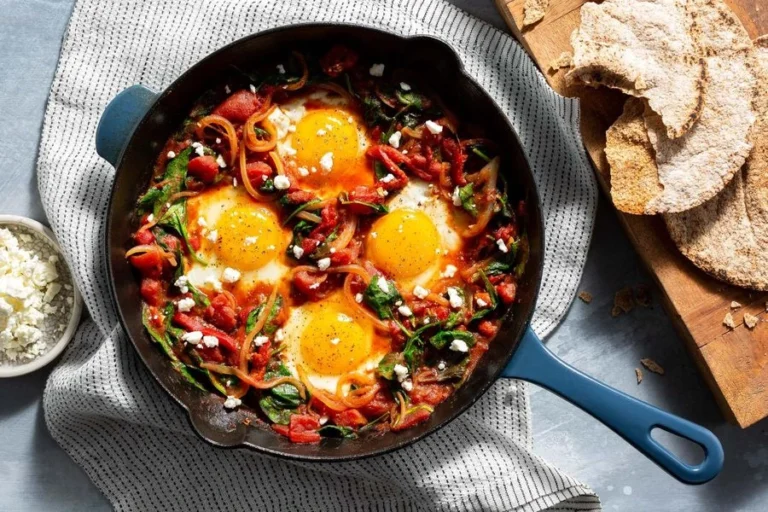
Enjoy this flavorful North African egg dish as part of your 7-day Mediterranean diet meal plan. Shakshuka combines poached eggs in a spicy tomato sauce, served alongside whole-wheat pita for a satisfying protein-rich meal.
Shakshuka Ingredients
For this budget-friendly dish (just $1.09 per serving), gather:
- 2 tablespoons olive oil
- 1 medium onion, chopped
- 1 bell pepper, diced
- 4 garlic cloves, minced
- Spices: 1 teaspoon cumin, 2 teaspoons paprika, ¼ teaspoon chili powder
- 1 (28-oz) can unsalted crushed tomatoes
- 6 large eggs
- Fresh cilantro and optional feta cheese
- Whole-wheat pita bread
Shakshuka Preparation Steps
Begin by heating oil in a large skillet over medium heat. Sauté onion and bell pepper for 5 minutes until translucent. Add garlic and spices, cooking for 1 minute. Pour in tomatoes, bring to a simmer, then cook for 10 minutes until slightly thickened. Create 6 indentations in the sauce, crack eggs into each, cover, and simmer for 10-12 minutes until egg whites set. Garnish with cilantro and feta if desired.
Shakshuka Nutritional Info
Each serving provides 131-202 calories, 6-10.3g protein[491], and 13.8g carbohydrates. This protein-rich dish contains 104mg cholesterol and delivers 15% of your daily vitamin C needs.
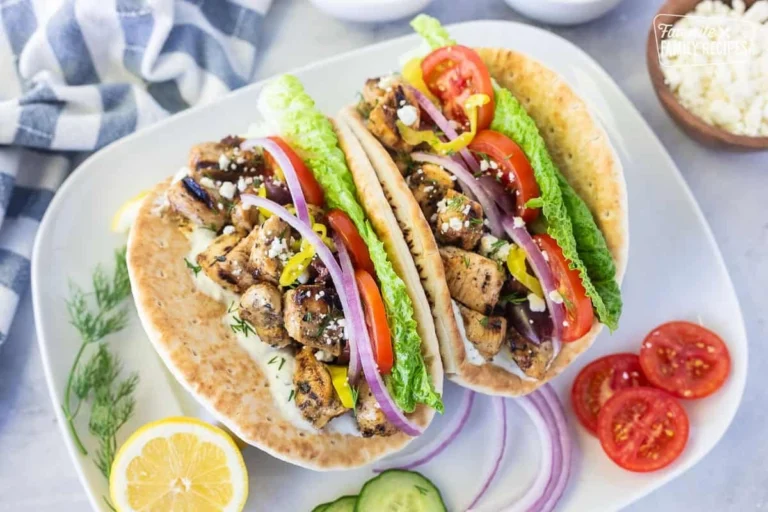
Bring authentic Greek flavors to your dinner table with these delicious chicken gyros. This protein-rich wrap makes a satisfying addition to your 7-day Mediterranean diet meal plan without sacrificing taste.
Chicken Gyros Ingredients
For the marinated chicken:
- 1½ lbs boneless skinless chicken (breasts or thighs), cubed
- ⅓ cup Greek yogurt
- ¼ cup olive oil
- ¼ cup lemon juice
- 6 garlic cloves, chopped
- 1 tablespoon smoked paprika
- 1 tablespoon fresh oregano
- Salt and pepper to taste
For serving:
- Fresh pitas or naan bread
- Feta cheese crumbles
- Mixed greens or lettuce
- Diced tomatoes and cucumber
- Red onion, thinly sliced
Chicken Gyros Preparation Steps
First, combine yogurt, olive oil, chicken, lemon juice, garlic, and seasonings in a bowl. Let marinate for 15 minutes at room temperature or refrigerate up to overnight. Preheat oven to 425°F and arrange marinated chicken on a baking sheet. Bake for 15 minutes, toss, then bake another 5-10 minutes until cooked through. Briefly broil for 1-2 minutes to char edges. Meanwhile, prepare tzatziki by blending feta, yogurt, garlic, and lemon juice until creamy. Assemble by stuffing each warm pita with tzatziki, lettuce, chicken, and toppings.
Chicken Gyros Nutritional Info
Each serving provides approximately 560-570 calories, 34g protein, 60g carbohydrates, and 19-20g fat. Indeed, this balanced meal delivers vital nutrients while aligning perfectly with Mediterranean diet principles.
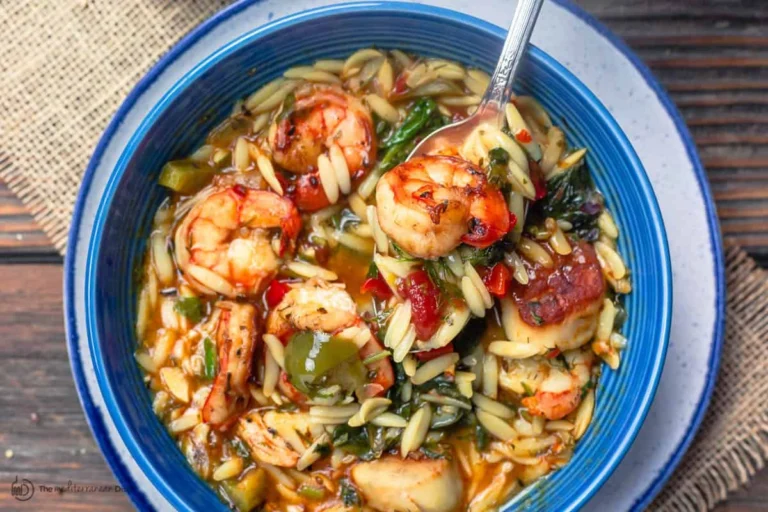
This quick-cooking shrimp linguine dish delivers Mediterranean flavors in just 25 minutes, making it an ideal addition to your 7-day Mediterranean diet meal plan.
Shrimp Linguine Ingredients
To create this flavorful pasta dish, gather:
- 8 ounces whole-wheat linguine
- 1 pound medium shrimp (31-40 count), peeled and deveined
- 2 tablespoons olive oil
- 1 medium onion, chopped
- 4 garlic cloves, minced
- 1 cup roasted red peppers, chopped
- 2-3 cups mixed vegetables (zucchini, mushrooms, spinach)
- ¼ cup white wine or low-sodium chicken broth
- Fresh herbs (parsley, basil)
- ½ teaspoon dried oregano
- ¼ teaspoon crushed red pepper flakes
- ¾ cup crumbled feta cheese
- 2 tablespoons lemon juice
Shrimp Linguine Preparation Steps
Cook linguine according to package directions, reserving ½ cup pasta water. Simultaneously, sauté shrimp and onion in olive oil until shrimp turns pink (3-4 minutes). Remove shrimp; add garlic and cook briefly. Combine vegetables, herbs, wine, and seasonings; simmer until tender. Return shrimp to pan, add drained pasta with reserved water, then stir in feta and lemon juice. The starchy pasta water creates a silky texture and helps thicken the sauce.
Shrimp Linguine Nutritional Info
Each serving contains approximately 315 calories, 19.7g protein, 39.4g carbohydrates, and 7.9g fat. Due to its seafood content, this dish provides valuable omega-3 fatty acids while delivering 39% of your daily protein needs. The addition of colorful vegetables increases fiber content and essential nutrients.
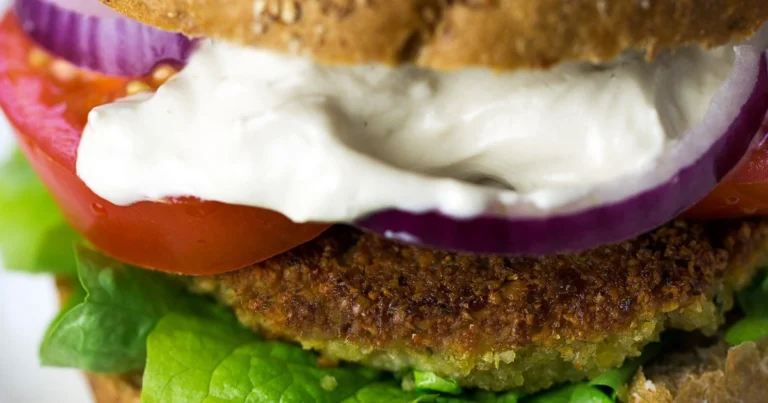
Create plant-based Mediterranean magic with these falafel burgers featuring a creamy sesame sauce. These protein-packed patties offer an excellent meatless option for your 7-day Mediterranean diet meal plan.
Falafel Burger Ingredients
For the patties, you’ll need:
- 1 can (15 oz) chickpeas, drained and rinsed
- ½ cup diced onion
- 2-4 garlic cloves, minced
- Fresh herbs (¼ cup each of parsley and cilantro)
- Spices: 2 tsp cumin, 1 tsp coriander, pinch of cayenne
- 2 tbsp sesame seeds
- ⅓ cup flour (whole wheat or almond meal)
- 1 tbsp lemon juice
For the sesame sauce, combine ½ cup tahini with water, lemon juice, minced garlic, and a dash of paprika.
Falafel Burger Preparation Steps
First, pulse herbs, garlic, and lemon juice in a food processor. Next, add chickpeas and pulse until incorporated but still chunky. Transfer to a bowl, add flour and mix until a firm dough forms. Shape into 4 patties, then refrigerate for 15 minutes. Bake at 375°F for 30-40 minutes, flipping halfway through. Alternatively, pan-fry until golden on both sides.
Falafel Burger Nutritional Info
Each burger provides about 447 calories, 15g fat, 62g carbohydrates, and 19g protein. Impressively, one serving delivers 13g fiber (46% daily value).
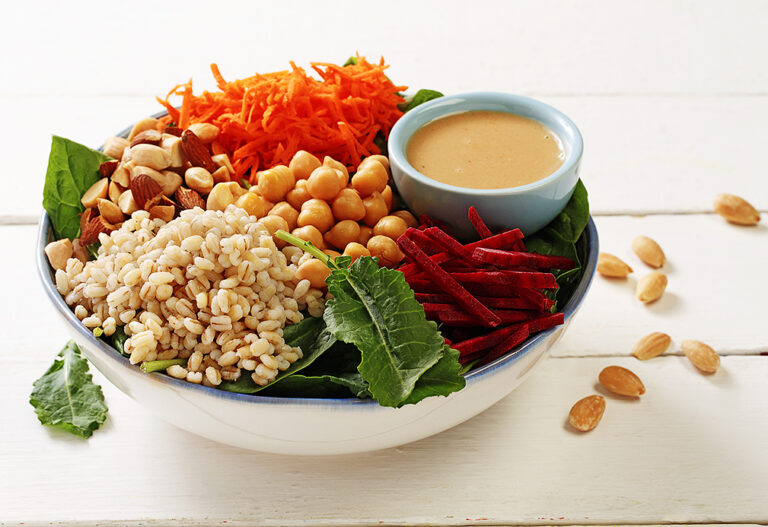
Fuel your day with this nutrient-packed Kale, Beet and Chickpea Power Bowl that delivers vibrant colors and robust Mediterranean flavors as part of your 7-day meal plan.
Power Bowl Ingredients
This energizing bowl requires:
- 3 cups fresh kale, stems removed and torn into bite-sized pieces
- 1 cup fresh or pre-cooked beets, grated or diced
- 2 cups cooked or canned chickpeas, drained and rinsed
- 1 cup cooked quinoa or brown rice
- ¼ cup pumpkin seeds (raw or toasted)
- ¼ cup nutritional yeast (optional for cheesy flavor)
- ½ avocado, sliced (optional)
- Fresh herbs like parsley or cilantro
For the dressing:
- 2 tablespoons tahini or natural peanut butter
- 1 tablespoon lemon juice
- 1 teaspoon minced garlic
- 1 tablespoon olive oil (optional)
Power Bowl Preparation Steps
In order to assemble this Mediterranean power bowl:
- Place chopped kale in a large bowl with lemon juice and optional olive oil, then massage until softened
- Mix in nutritional yeast and desired seasonings
- Add the cooked quinoa or rice and combine thoroughly
- Transfer this mixture to a serving plate or bowl
- Arrange the beets, roasted chickpeas, and avocado slices on top
- Sprinkle with pumpkin seeds
- For the dressing, whisk together tahini, water, lemon juice, and garlic until smooth
- Drizzle the dressing over the bowl just before serving
Power Bowl Nutritional Info
Even though this bowl appears simple, it packs impressive nutrition with approximately 39g of protein per serving. One serving provides high amounts of fiber, vitamins A, C, and valuable micronutrients. The dish delivers about 13g of fiber (46% of daily value) and serves as an excellent source of iron. Plus, any leftover dressing works wonderfully as a dip for vegetables.

Add plant-based protein to your 7-day Mediterranean diet meal plan with these flavorful stuffed bell peppers. These colorful vessels filled with black beans and rice provide a hearty dinner option without meat.
Stuffed Pepper Ingredients
For these Mediterranean-inspired peppers, gather:
- 4 bell peppers, any color, halved with seeds removed
- 1 can (15 oz) black beans, drained and rinsed
- 1 cup rice (brown rice for added fiber)
- ½ cup diced onion
- 2 garlic cloves, minced
- Spices: 1-2 tsp cumin, ½-1 tsp chili powder, ½ tsp oregano
- ¾ cup salsa or tomato sauce
- Optional toppings: shredded cheese, fresh cilantro
Stuffed Pepper Preparation Steps
Preheat your oven to 375°F. Cook rice according to package directions. Meanwhile, sauté onion until translucent, about 5 minutes. Add garlic and spices, cooking for another minute. Stir in black beans (mashing about half for texture) and salsa. Combine with cooked rice. Fill pepper halves with the mixture, place in a baking dish, and bake for 30-40 minutes until peppers have softened.
Stuffed Pepper Nutritional Info
Each serving provides approximately 200-500 calories depending on ingredients used. You’ll get about 5-19g protein, 32-62g carbohydrates, and 10-13g fiber – nearly half your daily fiber needs.
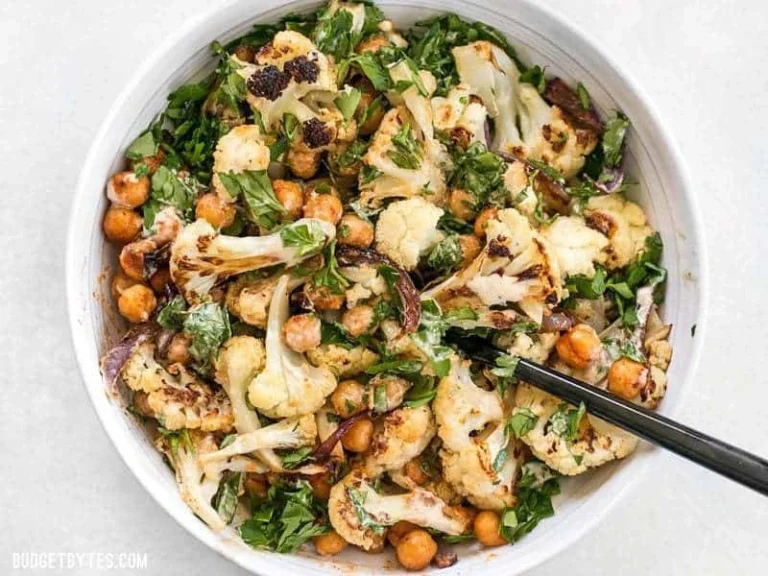
Roasting transforms humble cauliflower into a Mediterranean delight in this flavorful salad that adds depth and versatility to your 7-day meal plan.
Cauliflower Salad Ingredients
For this nutritious dish, you’ll need:
- 1 head cauliflower, cut into florets
- 4 tablespoons extra-virgin olive oil
- Seasonings (salt, pepper, optional curry powder or smoked paprika)
- 2-3 cups mixed greens (watercress or kale work beautifully)
- ⅔ cup toasted walnuts or sunflower seeds
- 1 cup crumbled feta or Gruyère cheese
- Optional add-ins: cherry tomatoes, red onion, fresh herbs like basil or parsley
Cauliflower Salad Preparation Steps
Preheat your oven to 400-425°F. Toss cauliflower florets with 2 tablespoons olive oil, salt, pepper, and optional spices until evenly coated. Spread in a single layer on a baking sheet and roast for 30-35 minutes, tossing occasionally, until tender and golden brown. Allow cauliflower to cool for 10-15 minutes. Meanwhile, prepare your dressing by whisking remaining olive oil with vinegar (sherry or red wine). In a large bowl, combine roasted cauliflower with greens, nuts, cheese, and any additional vegetables. Drizzle with dressing and toss gently.
Cauliflower Salad Nutritional Info
Each serving provides approximately 410 calories, with 15g protein, 8g carbohydrates, and 37g fat. Beyond these macronutrients, this salad delivers impressive nutritional benefits including approximately 204mg of vitamin C, representing over 100% of your daily needs. For a lower-calorie version (240 calories), reduce the nuts and cheese.
Comparison Table
| Recipe Name | Main Ingredients | Calories/Serving | Protein Content | Key Nutrients/Benefits | Meal Type |
|---|---|---|---|---|---|
| Greek Yogurt with Berries and Walnuts | Greek yogurt, berries, walnuts, honey | 250 | 19.5g | Probiotics, fiber, antioxidants | Breakfast |
| Cinnamon Roll Overnight Oats | Rolled oats, non-dairy milk, brown sugar, cinnamon, chia seeds | 191-250 | 4-6g | Complex carbs, prebiotics | Breakfast |
| Veggie and Hummus Sandwich | Whole-grain bread, hummus, mixed vegetables, avocado | 325 | 13g | 55% daily Vitamin C, fiber | Lunch |
| Vegan Superfood Grain Bowl | Quinoa, hummus, kale, beets, edamame, avocado | 381 | 16g | 75% daily Vitamin A, 47% daily fiber | Lunch/Dinner |
| Sheet-Pan Roasted Salmon and Vegetables | Salmon filets, sweet potatoes, mixed vegetables | 398-504 | 31-34g | 26% daily potassium | Dinner |
| White Bean and Veggie Salad | White beans, mixed greens, vegetables, avocado | 360 | 10g | 48% daily fiber, 27% daily potassium | Lunch |
| Summer Shrimp Salad | Shrimp, cucumber, tomatoes, corn, avocado | 250-290 | 28g | 28% daily Vitamin C, Omega-3 | Lunch/Dinner |
| Everything Bagel Avocado Toast | Whole-grain bread, avocado, everything bagel seasoning | 172-241 | 5-6g | 21% daily fiber | Breakfast |
| Stuffed Sweet Potato with Hummus | Sweet potato, chickpeas, hummus, tomatoes | 308 | 10.9g | High Vitamin A, 2.5mg Iron | Lunch/Dinner |
| Chicken Gyros with Feta | Chicken, Greek yogurt, feta, vegetables | 560-570 | 34g | Not mentioned | Dinner |
| Shrimp Linguine with Vegetables | Whole-wheat linguine, shrimp, vegetables, feta | 315 | 19.7g | Omega-3 fatty acids | Dinner |
| Falafel Burgers | Chickpeas, herbs, sesame seeds, tahini sauce | 447 | 19g | 46% daily fiber | Lunch/Dinner |
| Kale, Beet and Chickpea Power Bowl | Kale, beets, chickpeas, quinoa, pumpkin seeds | Not mentioned | 39g | High in fiber, Vitamins A & C, Iron | Lunch/Dinner |
| Stuffed Bell Peppers with Black Beans | Bell peppers, black beans, rice, onion | 200-500 | 5-19g | 10-13g fiber | Dinner |
| Roasted Cauliflower Salad | Cauliflower, mixed greens, walnuts, feta | 410 | 15g | 100%+ daily Vitamin C | Lunch/Dinner |
Conclusion
Throughout this guide, you’ve discovered how the Mediterranean diet combines delicious flavors with substantial health benefits. Research consistently shows this eating pattern reduces risk of cardiovascular disease, strokes, and even lowers all-cause mortality by up to 23%. The recipes presented here offer practical, simple ways to implement Mediterranean principles into your daily routine.
Starting with protein-rich breakfasts like Greek yogurt with berries or cinnamon roll overnight oats sets a solid foundation for your day. Lunches featuring hummus sandwiches or power bowls provide sustained energy without the afternoon crash. Dinner options such as sheet-pan salmon or chicken gyros deliver satisfying meals without complicated techniques.
Most importantly, this 7-day plan eliminates the guesswork from healthy eating. Each recipe balances proteins, complex carbohydrates, and healthy fats while delivering impressive nutritional benefits. Your body will thank you for the abundant fiber, vitamins, and minerals packed into these meals.
Remember that Mediterranean eating focuses on whole foods rather than strict rules. Feel free to mix and match these recipes based on your preferences and schedule. Many components can be prepared ahead of time, making healthy eating accessible even during busy weeks.
The beauty of this approach lies in its flexibility and sustainability. Unlike restrictive diets, these Mediterranean meals satisfy both nutritional needs and taste preferences. This balance explains why experts have named it the best diet eight years running.
Try integrating just a few of these recipes initially, then gradually expand your Mediterranean repertoire. Your journey toward better health can begin with something as simple as avocado toast for breakfast or a bean salad for lunch. Small, consistent changes ultimately yield the most significant long-term benefits.
Key Takeaways
The Mediterranean diet has been voted the best diet for 8 consecutive years, with research showing it can reduce cardiovascular disease risk and lower all-cause mortality by up to 23%.
• Start with simple 5-minute breakfasts like Greek yogurt with berries to establish protein-rich morning routines that sustain energy levels.
• Focus on plant-based proteins through recipes like falafel burgers and chickpea power bowls that deliver 15-39g protein per serving.
• Utilize sheet-pan cooking and overnight prep methods to make healthy Mediterranean eating accessible during busy weekdays.
• Balance each meal with whole grains, healthy fats, and vegetables to achieve the diet’s proven health benefits without restrictive rules.
• Mix and match these 21 recipes based on your preferences—the Mediterranean approach emphasizes flexibility and sustainability over strict guidelines.
The key to success lies in starting small with just a few recipes, then gradually expanding your Mediterranean repertoire. This balanced approach explains why the diet remains both scientifically proven and practically sustainable for long-term health improvements.
FAQs
Q1. What are the key components of a Mediterranean diet meal plan? A Mediterranean diet meal plan typically includes plenty of fruits, vegetables, whole grains, legumes, nuts, and olive oil. It also incorporates moderate amounts of fish, poultry, and dairy, while limiting red meat and processed foods. The focus is on whole, minimally processed foods and plant-based meals.
Q2. How can I incorporate more Mediterranean-style meals into my diet? Start by making small changes, such as using olive oil instead of butter, adding more vegetables to your meals, and eating fish twice a week. Try new recipes that feature Mediterranean staples like chickpeas, lentils, and fresh herbs. Gradually increase your intake of whole grains and reduce processed foods and red meat consumption.
Q3. Are there any quick and easy Mediterranean diet breakfast options? Yes, there are several quick and easy Mediterranean breakfast options. Greek yogurt with berries and walnuts, whole-grain toast with avocado and tomato, or overnight oats with cinnamon and fruit are all simple, nutritious choices that align with Mediterranean diet principles and can be prepared in minutes.
Q4. How does the Mediterranean diet benefit heart health? The Mediterranean diet has been shown to reduce the risk of heart disease by lowering inflammation, improving cholesterol levels, and helping to control blood pressure. Its emphasis on healthy fats from olive oil, nuts, and fish, along with plenty of fruits and vegetables, contributes to overall cardiovascular health.
Q5. Can the Mediterranean diet help with weight management? Yes, the Mediterranean diet can be effective for weight management. It emphasizes nutrient-dense, fiber-rich foods that help you feel full and satisfied. The diet’s focus on whole foods and healthy fats can lead to sustainable weight loss or maintenance when combined with portion control and regular physical activity.